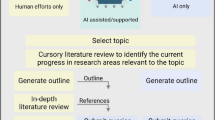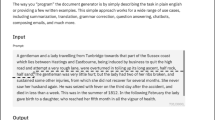Abstract
Using a naturalistic text generation and proofreading task, we investigated two questions concerning the effect of text familiarity on proofreading performance. Can experimental evidence be provided for the intuition that it is harder to proofread one's own writing than someone else's? Will the effect of text familiarity on proofreading differ as a function of whether the familiarity is self-generated or experimentally-induced? Subjects spent 30 minutes composing an essay on student life; after a 20 minute interval (Experiment 1) or a two week interval (Experiment 2) they proofread their own essay, another subject's essay after being familiarized on an error-free version of it, or another subject's essay without the benefit of a preview. Experiment 1 showed that subjects wereless able to detect errors (e.g.,The best part of student like is socializing.) in self-generated essays than in unfamiliar other-generated essays; on the other hand, they werebetter able to detect errors in familiar other-generated essays that in unfamiliar ones. Experiment 2 showed that the disadvantage for proofreading self-generated text is likely a by-product of extreme familiarity rather than any special quality of self-generated knowledgeper se. The results have implications for models of skilled reading.
Similar content being viewed by others
References
Anderson, J. R. (1985).Cognitive psychology and its implications. New York: W.H. Freeman.
Begg, I., Snider, A., Foley, F. & Goddard, R. (1989). The generation effect is no artifact: Generating makes words distinctive,Journal of Experimental Psychology: Learning Memory, and Cognition 15: 977–989.
Bowers, K. S. & Hilgard, E. (1986). Some complexities in understanding memory. In: H. M. Pettinati (ed.),Hypnosis and memory (pp. 3–18). New York: Guilford Press.
Daneman, M. (1988). How reading braille is both like and unlike reading print,Memory & Cognition 16: 497–504.
Daneman, M. & Stainton, M. (1991). Phonological recoding in silent reading,Journal of Experimental Psychology: Learning, Memory, and Cognition 17: 618–632.
Einstein, G. O., McDaniel, M. A., Bowers, C. A. & Stevens, D. J. (1984). Memory for prose: The influence of relational and proposition-specific processing,Journal of Experimental Psychology: Learning, Memory, and Cognition 10: 133–143.
Glisky, E. C. & Rabinowitz, J. C. (1985). Enhancing the generation effect through repetition of operations,Journal of Experimental Psychology: Learning, Memory, and Cognition 11: 193–205.
Greenwald, A. G. (1981). Self and memory. In: G. H. Bower (ed.),The psychology of learning and motivation, Vol.15 (pp. 201–236). New Yokr: Academic Press.
Greenwald, A. G. & Banaji, M. R. (1989). The self as a memory system: Powerful but ordinary,Journal of Personality and Social Psychology 57: 41–54.
Haber, R. & Schindler, R. M. (1981). Errors in proofreading: Evidence of syntactic control of letter processing,Journal of Experimental Psychology: Human Perception and Performance 7: 573–579.
Healy, A. (1980). Proofreading errors in the wordthe: New evidence on reading units,Journal of Experimental Psychology: Human Perception and Performance 6: 45–57.
Hirshman, E. & Bjork, R. A. (1988). The generation effect: Support for a two-factor theory,Journal of Experimental Psychology: Learning, Memory, and Cognition 18: 484–494.
Jacoby, L. L. (1978). On interpreting the effects of repetition: Solving a problem versus remembering a solution,Journal of Verbal Learning and Verbal Behavior 17: 649–667.
Jacoby, L. L., Kelley, C. M. & Dywan, J. (1989). Memory attributions. In: H. L. Roediger & F. I. M. Craik (eds.),Varieties of memory and consciousness: Essays in honour of Endel Tulving (pp. 391–442). Hillsdale, NJ: Erlbaum.
Just, M. A. & Carpenter, P. A. (1987).The psychology of reading and language comprehension Newton, MA: Allyn & Bacon.
Levy, B. A. (1983). Proofreading familiar text: Constraints on visual processing,Memory & Cognition 11: 1–12.
Levy, B. A. & Begin, J. (1984). Proofreading familiar text: Allocating resources to perceptual and conceptual processes,Memory & Cognition 12: 621–632.
Levy, B. A., Di Persio, R. & Hollingshead, A. (1992). Fluent rereading: Repetition, automaticity, and discrepancy,Journal of Experimental Psychology: Learning, Memory, and Cognition 18: 957–971.
Levy, B. A. & Kirsner, K. (1989). Indirect measures of word and message level processes,Journal of Experimental Psychology: Learning, Memory, and Cognition 15: 407–417.
Levy, B. A., Newell, S., Snyder, J. & Timmins, K. (1986). Processing changes across reading encounters,Journal of Experimental Psychology: Learning, Memory, and Cognition 12: 467–478.
Lindsay, P. H. & Norman, D. A. (1977).Human information processing: An introduction to psychology. San Diego, CA: Academic Press.
McDaniel, M. A., Waddill, P. J. & Einstein, G. O. (1988). A contextual account of the generation effect: A three-factor theory,Journal of Memory and Language 27: 521–536.
McFarland, C. E., Jr., Frey, T. J. & Rhodes, D. D. (1980). Retrieval of internally versus externally generated words in episodic memory,Journal of Verbal Learning and Verbal Behavior 19: 210–225.
Perfetti, C. A. (1985).Reading ability. New York: Oxford University Press.
Reed, G. (1974).The psychology of anomalous experience: A cognitive approach. Boston, MA: Houghton Mifflin Co.
Rogers, T. B., Kuiper, N. A. & Kirker, W. C. (1977). Self-reference and the encoding of personal information,Journal of Personality and Social Psychology 35: 677–688.
Slamecka, N. J. & Graf, P. (1978). The generation effect: Delineation of a phenomenon,Journal of Experimental Psychology: Human Learning and Memory 4: 592–604.
Slamecka, N. J. & Katsaiti, K. T. (1987). The generation effect as an artifact of selected displaced rehearsal,Journal of Memory and Language 26: 589–607.
Author information
Authors and Affiliations
Corresponding author
Rights and permissions
About this article
Cite this article
Daneman, M., Stainton, M. The generation effect in reading and proofreading. Read Writ 5, 297–313 (1993). https://doi.org/10.1007/BF01027393
Issue Date:
DOI: https://doi.org/10.1007/BF01027393




